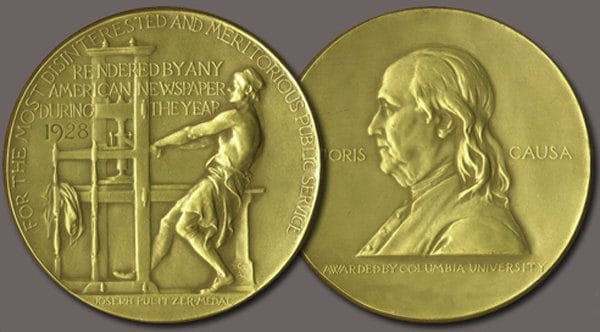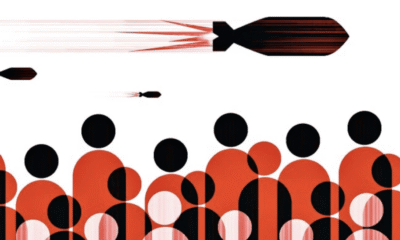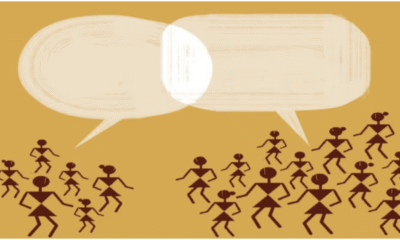
|
Getting your Trinity Audio player ready...
|
Pulitzer’s description of Kashmir as ‘independent’ defies all logic because the region’s political status is a primary general knowledge.
Like actions, words also acquire notoriety because of the situations they are identified with. ‘Lügenpresse’ is one such German term that acquired notoriety in Nazi Germany during the Second World War. Hitler’s propaganda man, Joseph Goebbels used Lügenpresse to defame the print media and supply free radio service to all the Germans. The media service would relay only the government-approved propaganda. ‘Lügenpresse’, the epithet popularised about the newspapers by the Nazis, meant a ‘lying press’.
Because of its infamous links with the Nazis, this otherwise innocuous-sounding word became blasphemous in Germany and all over the world. So, when it returned in the political discourse in the West during the 2016 US presidential elections, the liberal media pounced on it. Their main contention was that the ‘Lügenpresse’ slogans were raised at a rally of the supporters of Republican candidate Donald Trump.
True, Trump and his followers are angry with media, and for that matter many Indians, are riled over the Pulitzer prizes, blaming the committee for awarding “fake news” and “violence” this year. But does that automatically make the word criminal?
Who are ‘Lügenpresse’
It is nobody’s case to blame the entire media of falsehood. It is a tactic that authoritarians use to silence the free media, which should be resisted. Media freedom is as sacrosanct as individual freedom. From Mill (John Stuart Mill) to Marx (Karl Marx), all Enlightenment thinkers have taught the world the importance of freedom. Authoritarians and autocrats are the ones that find this freedom, of individuals as well as the media, a threat to their regimes.
Enlightenment wisdom holds that everybody’s freedom is sacrosanct. In the Communist Manifesto, even Marx agrees that “the free development of each is the condition for the free development of all”. Just as the media has a right to criticise political establishment as liars, the supporters of a political establishment too have the right to criticise sections of the media as ‘Lugenpresse’. They don’t automatically become neo-Nazis.
The term ‘Lügenpresse’ was not coined by the Nazis as our liberal media wants us to believe. It was first coined in 1918, or even earlier as some accounts go. The German Defense Ministry had released a book in 1918 titled The Lugenpresse of Our Enemies. The phrase was also in use in Communist East Germany to describe the media in European and American democracies.
Return of this vocabulary is a cause of concern though. Not just the Trump supporters in America, even the opponents of lockdown in Germany are using this stigmatised word increasingly. The condemnable attacks on the media are happening in Germany and other places because of the growing disbelief and mistrust about the media. Mainstream media in many parts of the world is facing a credibility challenge today.
The 2020 Pulitzer awards controversy
The 2020 Pulitzer awards is a case in point. This Columbia University-led prestigious media awards group has not covered itself in glory in announcing this year’s winners. It faced criticism from Trump, of course. He called them a bunch of thieves and demanded that they return their prizes. His argument was that the award should go to those journalists who ‘got it right’, while the winners, The New York Times scribes, got it all wrong about the Russian involvement in American affairs. He cited the latest Department of Justice decision to drop the proceedings against Michael Flynn to call the Pulitzer committee “a disgrace”.
Maybe Trump is typically overreacting. But the remonstrations of the Chair of the Pulitzer Prize Board, Eugene Robinson were not convincing either. “All the journalists and playwrights and authors and poets and composers who have won Pulitzer Prizes have one thing in common, which is that they were all engaged in a search for truth,” he argued using a moral façade, adding “And we must believe that there IS truth”.
Robinson’s statement sounds hollow, at least in the case of the awards given to Indian journalists. Protests in India were not so much against the three award-winning photojournalists. Any Indian winning prestigious award is a matter of pride for all Indians. The protests were more about the Pulitzer’s dishonesty. “For striking images of life in the contested territory of Kashmir as India revoked its independence, executed through a communications blackout,” the award citation read. Describing Kashmir “independent” is a low in journalism. It sounded as though the sentence was directly borrowed from the terrorists and separatists in Kashmir.
When Pulitzer got it wrong
Pulitzer has had a history of such accusations. In the early phase of its inception, the award Pulitzer gave to NYT journalist Walter Duranty in 1931 became a big controversy. He was accused of taking down dictations from Stalin and making them into stories. He was called “journalism’s greatest liar” and “Stalin’s apologist”. Even NYT was allegedly unhappy over the award. But the Pulitzer Board, after twice considering revocation, decided to uphold its decision.
In its century-old existence, Pulitzer has been involved in many such controversies. One such recent controversy, relevant to the present discussion, was about the photography award to Bilal Hussein of Associated Press in 2004. His collection of 20 photos, for which he won the Pulitzer, basically depicted wartime heroism of the terrorists shooting rockets and executing people on the streets. There were accusations that those photos were actually facilitated by the terrorists themselves. Finally, Bilal was arrested by the US in 2006.
Pulitzer’s description of Kashmir as “independent” defies all logic because the region’s political status is a primary general knowledge. It is another matter that some Indian leaders who have problems with this general knowledge jumped in and congratulated the journalists and their awards prematurely. What exposed Pulitzer further was their clandestine amendment to their own statement. “For striking images captured during a communications blackout in Kashmir depicting life in the contested territory after India stripped it of its semi-autonomy,” the amended statement reads now. Kashmir’s “independence” is suddenly missing.
No one is above mistakes. Pulitzer would have overcome criticism had they admitted their mistake publicly instead of amending it slyly. “Let us agree on what facts are” – I am borrowing from Eugene’s statement.
(The article was originally published in The Print on May 12, 2020. Views expressed are personal.)



